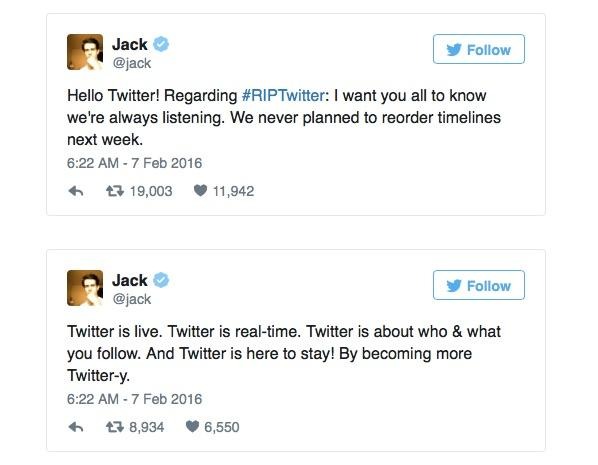Twitter CEO responds to timeline outrage, changes will be opt out
Twitter went into a collective outrage yesterday, and rightfully so, after a report indicated that the social network would be abandoning the reverse chronological order of its timeline in favor of one organized by an algorithm. And while another source indicated that any such change would be strictly opt-in, it wasn't enough to stop a large number of users from threatening to leave the network. Fortunately, Twitter CEO Jack Dorsey has responded to the outcry — organized under #RIPtwitter — to assure everyone the real-time feed wasn't going away.
Dorsey indicated that Twitter was never planning to move to a Facebook-style timeline, with tweets organized by relevancy or popularity, which BuzzFeed reported was on its way next week. "Twitter is live. Twitter is real-time. We love the live stream. It's us. And we're going to continue to refine it to make Twitter feel more, not less, live!", the CEO shared in a series of tweets.

However, that doesn't mean there aren't a few changes on their way to the social network. The Verge has learned that what's really in the works is an expansion of Twitter's "while you were away" feature. It's this algorithm that may re-order users' timeline, but only in a minimal way.
Basically, if someone doesn't visit or use Twitter for a full day, they'd be presented with a series of highlighted tweets from that period. They can scroll down to browse these tweets, but all they need to do is pull the stream down to refresh to see their timeline in the standard reverse chronological order.
But even if this sounds like the worst thing ever to you, don't worry: users will be able to opt out of this feature. This is probably the best news to come out of all this, as it seems nearly everyone recognizes that as a service, Twitter is at its best when acting as a tool for real-time information, whether it's breaking news or reactions to a live event. And losing that would be the real tragedy.
SOURCE Jack Dorsey/Twitter 1, 2, 3, The Verge
